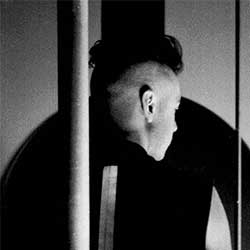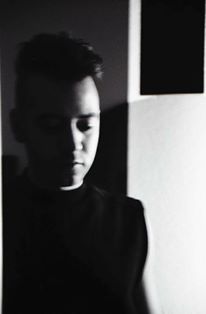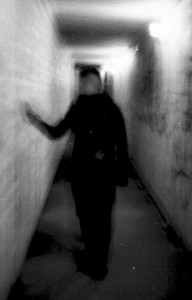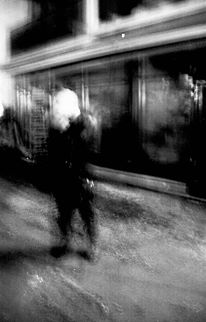Published by Alessandro Violante on March 23, 2016
 We have interviewed, and this wasn’t made before, Joey Blush for Flux Webzine, musically known as Blush Response, american artist and sound designer currently living in Berlin. His work is a valid example of a fruitful connection between techno pulses and industrial-EBM suggestions, capable of horizontally cutting sounds and musical genres, maintaining his cyberdark-imaginative sound and his deeply obscure mood. Blush has made three albums: We Are Replicants, Tension Strategies (Basic Unit Productions / Tundra) in 2013 and Desire Machines released in 2014 by Desire Records. In July of 2015, the 12” EP Future Tyrants was released by the underground Berlin-based label Aufnahme+Wiedergabe, followed by the live Night of the Machines. Rebirthed in the Sprawl is a release on two tapes released on 16th January by Total Black. His new album, titled Reshaper, is going to be released by Ant-Zen on 8th April, and his new EP is going to be released by Aufnahme+Wiedergabe, titled Body Architect.
We have interviewed, and this wasn’t made before, Joey Blush for Flux Webzine, musically known as Blush Response, american artist and sound designer currently living in Berlin. His work is a valid example of a fruitful connection between techno pulses and industrial-EBM suggestions, capable of horizontally cutting sounds and musical genres, maintaining his cyberdark-imaginative sound and his deeply obscure mood. Blush has made three albums: We Are Replicants, Tension Strategies (Basic Unit Productions / Tundra) in 2013 and Desire Machines released in 2014 by Desire Records. In July of 2015, the 12” EP Future Tyrants was released by the underground Berlin-based label Aufnahme+Wiedergabe, followed by the live Night of the Machines. Rebirthed in the Sprawl is a release on two tapes released on 16th January by Total Black. His new album, titled Reshaper, is going to be released by Ant-Zen on 8th April, and his new EP is going to be released by Aufnahme+Wiedergabe, titled Body Architect.
1) Hi Joey! Tell us something about you. What’s your background? What are your main musical and artistic sources of inspiration? Can you tell us also something about your work as sound designer and about the artists with which you have collaborated and with which you would like to collaborate in the future?
I started writing music when I was 16-17 ish. I was basically living in my parents basement in New York. I got a synth and pirated some recording software and would spend days upon days recording and dicking around with gear. I have always been an introverted person, and working by myself brought me peace. It’s therapeutic for me to sit down and touch my gear and see what comes out. As for influences – there are so many, too many to name. Every aspect of my life influences my work. Most of my tracks are done in a short time, and thus, if you want to understand how my influences affect me, the best way is to listen to my music. My tracks are like snapshots of my mental state at the time of writing. I try to get them done in a short time because I want to capture the moment. I don’t like tracks that take ages to complete and become these lumbering beasts that are cobbled together from unrelated parts done over many days or weeks. I need everything to gel right then and there. I craft every sound from the ground up. Every drum and synth sound are made on the spot for the tracks they are used in. I try to never use the same sounds twice.
Collaboration wise, I’ve done sound design work for a few acts, from Fear Factory, to live synths with Scar the Martyr, and other artists like Cristian Castro. I recently produced and mixed a new industrial / noise group as well – my first time as proper producer and not just a programmer.
I’m collaborating with a lot of people here in Berlin as well – more on that later.
2) Listening to your albums, your great passion for modular synths and for the classic Roland drum machines emerges, with which you have developed a very good technique in studio as well as in the live dimension. Do you think it’s important today to recover a certain kind of sound by means of a sort of full contact with the analogue machines?
I don’t use any Roland machines. My main drum machine is the Elektron Analog Rytm. Sometimes I use my modular for drums as well. When writing music, I try to create sounds that are both visibly performative and expressive. I want to play my instrument, not create something that plays itself, so I make sounds that are tweakable and react to my touch. Physicality in performance is important to me. I want people to be able to see that my gestures affect the sound. If I’m touching the instrument, something is happening to the sound. This is reflected in both my live and studio approaches.
In my journey through learning synthesis, I spent many years trying to find the right piece of gear that would allow me the expression I desired. One of the first synths to really blow my mind was the Korg MS20. I had used other analog synths before, but never something as visceral and intuitive as the MS20. The filters screamed in such a beautiful way, and the expressive nature of its controls completely changed synthesis for me. I was no longer trying to play keyboard melodies, or create patches that would evolve by hitting a key, but instead getting really physical with the knobs as I played along with the keys. The next thing I got after this was a Sherman Filterbank, and, by pairing these two together, I had an idea of what a real modular system felt like. The level of control over sound was astounding, and I needed more. Thus, the logical next step was a Eurorack system. I started my system in 2010 and it’s been a crazy ride since.
3) Since Desire Machines, your third album, you moved toward a musical area closer to techno if we think about your early EBM – electro-industrial formula. Has the fact that you moved to Berlin influenced this change? Can you talk us about your techno influences? What are the artists that you feel closer to today? Do you prefer a more North American or a more European approach?
I was a bit ignorant to techno for most of my musical career. I was always into Industrial and IDM stuff. So stuff like Skinny Puppy, COIL, Front Line Assembly, Autechre, Aphex Twin, Venetian Snares, etc… I never heard or paid any real attention to techno until the first time I heard stuff like Orphx, Adam X, and Ancient Methods. Hearing their work was a revelation for me – I had always been trying to write industrial music with vocals because I felt that was the only thing that was viable. Once I understood you could write compelling, tough music that was electronic without vocals, I didn’t feel the need to sing anymore. It was always something I forced myself to do. I have always felt much more comfortable behind the synths rather than with a microphone in my hand.
4) Talking more in detail about industrial music, what had been and what currently are your musical influences? Do you still feel close to the sound of Basic Unit Productions’s artists such as Haujobb or Blac Kolor, or do you think that you have evolved your music in different directions?
I think my sound has always been my own – I never tailor my sound to anyone or any label, and back when I was working with Basic Unit I had already developed the sound of my releases on there before submitting to them. My stuff now is definitely in a different place since then, but only because I am always trying new things. I have to keep it interesting for myself.
5) How much do you feel close to a cyberpunk, obscure and dystopic imaginary? Listening to Future Tyrants, it seems to me that you have cannibalized several literary and cinematographic suggestions, reinterpreting them in an original way through your personal sound; a thing that seems to emerge very well, although in a different way, in your recent ambient tape released by Total Black, Rebirthed in the Sprawl…
All of that imagery is pretty much razor burned in my mind. I grew up reading cyberpunk literature (Neuromancer, Snow Crash), playing cyberpunk games (Deus Ex, Perfect Dark), and watching Cyberpunk films (Blade Runner, Ghost in the Shell). It’s an aesthetic I’ve always been passionate about, and it just resonates with me. Something about the connection between humanity and machine – expansion of the mind through digitization, either through evolution, body modification, or entry into a virtual world. These images and experiences are something I try to channel into my music every time I write. They are a part of me – though I don’t want to always try for the same thing. I’m always searching for new inspiration. Cyberpunk was definitely the starting point.
6) In some way, your very good remix for The Soft Moon’s Far seems to keep on evolving Future Tyrants’s sound towards an ever-maximalist, fast and saturated approach, also close to your live performances. Do you think that you’ll follow this direction also in your next work or that you’ll explore more ambient-like sounds as those shown in Rebirted in the Sprawl?
Rebirthed in the Sprawl was a one off experiment, initially for a podcast, and then I decided to explore it a bit more. It ended up convenient that Total Black was looking to do a dual cassette release and I had enough material for it, so we got it all together very quickly.
I think Blush Response will always remain beat-oriented from now on, if I choose to do more ambient stuff it will be under a different name. The new stuff is coming soon so everyone will hear what I’ve been up to in the past year. I’m always writing new material as well, I like to have a constant flow of output. I feel that by always creating, I am always learning and improving. It’s fun for me, I need to write to function, and I try to find new approaches every time.
7) Listening to your mix for The Brvtalist, an attitude capable of shuffling the cards emerge: from EBM to Power Noise, to the current techno sound of artists as Phase Fatale or Ancient Methods. Do you believe that nowadays a new attitude that overcomes the fences put between several electronic music genres (not only industrial-related) is emerging? Maybe aimed at creating a more physical, straight and sharp sound as well as obscure and metropolitan?
Genre lines are a difficult thing because perception is everything. A goth label releasing techno may never be seen as techno because the techno scene perceives it to be from outside their spectrum – even if the music is not much different. When I made that mix for The Brvtalist, I tried to both show my influences, and show the links between every era of industrial music. From industrial techno to EBM to rhythmic noise to early industrial. All of these genres share common elements, the only dividers being the choice in sounds and the perception others place on them. To me, Techno is EBM is industrial is Noise. It’s all about the palette of sounds used. I was DJing at Suicide Circus recently and played Download – Glassblower into Pfirter into Klinik and the crowd went nuts. People tend to shy away from stepping outside of their genre comfort zone because of their perceptions about what techno is or isn’t, and they don’t stop to realize that all of these things are coming from similar places – albeit with their own approaches. It’s cool to mix and match.
8) Do you think that nowadays it could be possible to talk about a European scene that, through an approach to electronic music that pays attention to its origins and to its industrial and post-industrial trademarks, succeeds in breaking some “genres” bounds and some old cliché and renovating it through the work of young musicians that recover and develop in new ways the work of masters such as Chris & Cosey, Test Dept, ecc? I think also about the comeback of the Berlin Atonal…
I think it’s great to show respect to the originators of any genre one participates in – I certainly wouldn’t be here today without my influences. At the same time, I think people should strive to find new references to work from. I don’t want to hear people continually trying to rewrite the book that Front 242 or The Klinik wrote. I want to make something new, I want to surprise people and make them think. The Industrial techno thing is definitely becoming quite big now, and it seems a lot of artists from outside the scene are dabbling and remixing older industrial tracks and such. I’ve definitely heard my fair share of EBM tracks played at Berghain. While that’s cool and all, at the end of the day I think it’s better to strive for new sounds. Repeating ourselves will never be interesting. And I don’t want to go to a club to hear a new remix of an old song from an old band. I’d rather hear something completely new and refreshing.
9) Do you have any plans for the future? New remixes? Should we expect a new full length shortly?
The first thing coming up is my new album, RESHAPER, coming out April 8 on Ant-Zen. I will be playing live in Berlin for the Liber Null party at Arena Club that same day, it will be the release party for the album, and it’s also my birthday. So it will be the most selfish day of all! Event info here
After that, there will be an accompanying 12″ called BODY ARCHITECT on Aufnahme+Wiedergabe – closer to the summer. There is also a split 12″ coming on Violet Poison‘s new label Veleno Viola. It will be two tracks from me, and two from another artist. That is out for mastering now.
I just had a new track called SCALEBOUND come out on a cassette compilation for Total Black, and will have another new track on a vinyl compilation for Bombtrap Records on March 29.
I’ve also started a new project with SARIN named KONKURS. We’ll be having our live debut at the FLEISCH party in Berlin on April 23, alongside Schwefelgelb for the release of their new record, and the launch of FLEISCH as a label. And another new project with the guys from Ontal. More news on that soon.
Remix wise – I just completed one for Verset Zero, that should be out sometime soon, and a couple more I can’t announce yet. Rest assured this will be a busy year for me. I’m always writing new material!





